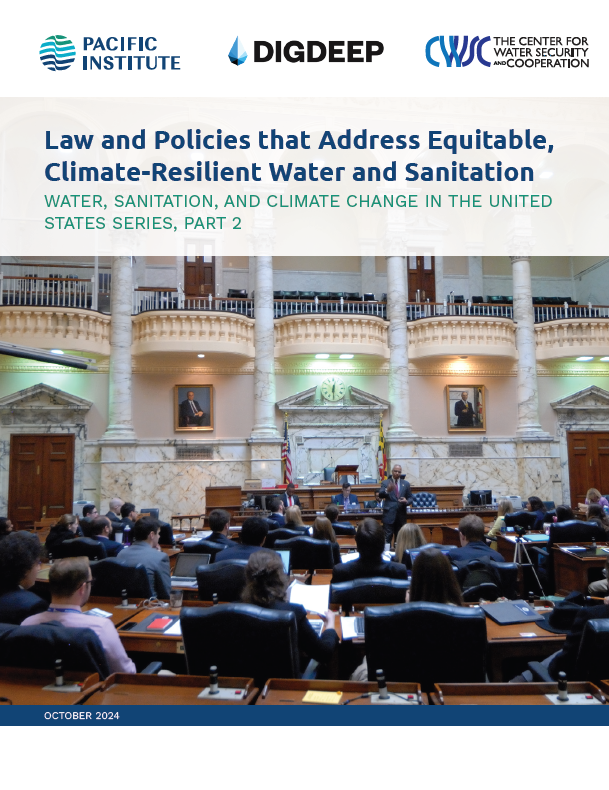Law and Policies that Address Equitable, Climate-Resilient Water and Sanitation: Water, Sanitation, and Climate Change in the United States Series, Part 2

Law and Policies that Address Equitable, Climate-Resilient Water and Sanitation: Water, Sanitation, and Climate Change in the United States Series, Part 2
Overview
As climate change intensifies, its impacts are most acutely felt through water-related challenges. Droughts are becoming longer, warmer, and more frequent, leading to water supply shortages for homes, businesses, and ecosystems and increasing wildfire intensity. Flooding from extreme storms and more intense precipitation events can damage water and wastewater infrastructure or disrupt services for homes and communities. Wildfires can wreak havoc on water quality, leaving homes and communities without access to safe water to drink. For frontline communities – those that are overburdened and under-resourced who face the disproportionate first and worst impacts of climate change on their water and sanitation access or system – these events can be devastating, potentially causing a home or community to lose access to safe drinking water and sanitation, either temporarily or permanently.
This report, Part 2 in the Water, Sanitation, and Climate Change in the United States series, reveals existing laws and policies fail to protect water and sanitation systems from climate change impacts in frontline communities across the United States. Authored by the Pacific Institute and the Center for Water Security and Cooperation (CWSC), the report, “Law and Policies that Address Equitable, Climate-Resilient Water and Sanitation” in the United States, examines federal, Tribal, state, and local laws and policies governing centralized drinking water and wastewater systems, as well as decentralized onsite drinking water and sanitation systems. The report underscores that existing laws and policies do not recognize water and sanitation as human rights nor adequately protect against climate impacts, threatening to widen the water access gap.
The report addresses several considerations for the development of future laws and policies. It highlights the importance of explicitly considering how laws and policies influence the ways that climate change will impact water availability, services, and access; the design, location, and operation of water and sanitation infrastructure; and the quality of drinking water. It also points to the role laws can play in creating funding mechanisms to help overburdened and under-resourced communities access funding to build equitable, climate-resilient water and sanitation systems.
Key Messages
Key messages from the report include:
- Laws have typically not been designed to be flexible or anticipate climate change impacts on water and sanitation infrastructure and services. As water scarcity increases, so will the pressure on these systems to deliver sufficient, reliable water, especially in places where laws do not prioritize, protect, and plan for equitable drinking water access for all. Many existing water management and allocation laws create a water rights structure that is too rigid, making it hard to adapt to changing water availability, while still meeting critical needs, such as for drinking water.
- Millions of people in the US are already served by water systems with incomplete plumbing and Safe Drinking Water Act violations. Water quality degradation from more frequent and intense droughts, floods, wildfires, and extreme temperatures only increases the importance of laws that serve to protect public health and water quality.
- Wastewater and drinking water systems serving frontline communities are more susceptible to the increased frequency and severity of storm events, catastrophic flooding, and sea level rise. Laws are not keeping pace to require existing centralized and decentralized water and wastewater infrastructure to proactively adapt or that new infrastructure is built to be climate resilient.
- The human right to water and sanitation are not legally recognized across the United States, except for in five states, California, Virginia, Massachusetts, New York, and Pennsylvania. This leaves frontline communities vulnerable to losing access to water, especially when more frequent and more severe storms take systems offline for days, weeks, or even months, and rising costs make services unaffordable, leading to disconnections for low-income residents without shutoff protections.
Additional Resources
Explore the Series
- Water, Sanitation, and Climate Change in the United States Series
- Blog: The Growing Threat of Catastrophic Flooding in Rural America
- Climate Change Impacts to Water and Sanitation for Frontline Communities in the United States, Part 1
- Achieving Equitable, Climate-Resilient Water and Sanitation for Frontline Communities, Part 3
- Webinar: Achieving Equitable, Climate-Resilient Water and Sanitation for Frontline Communities, Part 3

